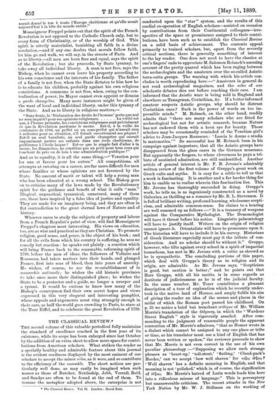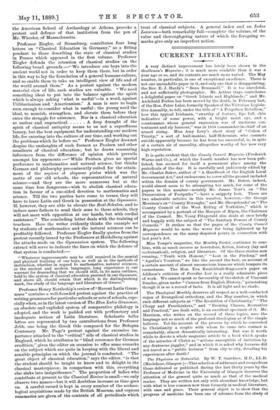THE CLASSICAL REVIEW.*
THE second volume of this valuable periodical fully maintains the standard of excellence reached in the first year of its existence, while its scope has been enlarged since last October by the addition of an extra sheet to allow more space for contri- butions from American scholars. What strikes the reader as a specially healthy and admirable feature about this journal is the evident readiness displayed by the most eminent of our scholars to accept the minor roles, as it were, and so contribute to the efficiency of the ensemble. The short notices are par- ticularly well done, as may easily be imagined when such names as those of Butcher, Nettleship, Jebb, Verrall, Reid, and Sandys are often to be found at the end of them. To resume the metaphor adopted above, the enterprise is not • The Classical Review. VoL II. London : David Mat. conducted upon the " star " system, and the results of this cordial co-operation of English scholars—assisted on occasion by contributions from their Continental colleagues—irre- spective of the space or prominence assigned to their contri- butions, have been such as to establish the Classical Review on a solid basis of achievement. The contents appeal. primarily to trained scholars, but, apart from the severely critical sections, there is generally something of interest to the lay reader. One does not need to have the classics at one's fingers' ends to appreciate M. Salomon Reinach's amusing account of the pretty quarrel which has been raging between the archeologists and the amateurs over the so-called Asiatic terra-cotta groups. The warning with which his article con- cludes is worth reproducing here :—" Amateurs in general do not read archeological magazines, and the echo of our scholastic debates dies out before reaching their ears. I am informed that the Asiatic ware is being sold in England and elsewhere as Tanagrean, Corinthian, &c. If a better informed amateur suspects Asiatic groups, why should he distrust Corinthian ones ? Such is the power of words on too im- pressible minds." M. Reinach, on the other hand, readily admits that "there are many scholars who are fitted for archeological but not for artistic research, because Nature has not endowed them with a keen eye for beauty. Those scholars may be occasionally reminded of the Venetian girl's advice to Jean-Jacques Rousseau : Lascia le donne e stadia, Is matematica.' " So successful has M. Reinach been in his campaign against imposture, that all the Asiatic groups have disappeared from the glass cases in the German museums. But apparently the forgers, to whose cleverness he pays a tri- bute of unstinted admiration, are still unidentified. Another article of general interest is Mr. F. B. Jevons's admirably written review of the first volume of Gruppe's great work on Greek cults and myths. It is easy for a critic to tell us that a work is fascinating. It is another and a far harder thing for him to enable us to realise wherein this fascination lies. This Mr. Jevons has thoroughly succeeded in doing. Gruppe's work, he tells us, is as ingeniously constructed as a novel by G-aboriau, as thrilling as a romance by Mr. R. L. Stevenson. It is full of brilliant writing, profound learning, wholesome scepti- cism, and admirable common-sense. Its claims to a hearing are well summed up as follows :—" It is a treasury of weapons against the Comparative Mythologist. The Demonologist will have it thrust before his notice. Linguistic paleontology will have to justify itself. Writers on the origin of religion cannot ignore it. Orientalists will have to pronounce upon it. The historian will have to include it in his survey. Historians of Greek literature especially must pay it the tribute of con- sideration. And no scholar should be without it." Gruppe, however, who tilts against every school in a spirit of impartial iconoclasm, has met in Mr. Jevons with a critic as shrewd as he is sympathetic. The concluding portions of this paper, which deal with Gruppe's theory as to religion and its origin, are admirable. As Mr. Jevons says, "Scepticism is good, but caution is better ;" and he points out that Herr Gruppe, with all his merits, is in some regards as destitute of judiciousness as he is of the judicial faculty. In the same number, Mr. Tozer contributes a pleasant description of a tour of exploration which he recently under- took in the native land of Horace, and amply fulfils his aim of giving the reader an idea of the scenes and places in the midst of which the Roman poet passed his childhood. On p. 35 we notice a brief but trenchant critique of Mr. William Morris's translation of the Odyssey, in which the " Wardour Street English" style is vigorously assailed. After com- mending to the judgment of reasonable people the apparent contention of Mr. Morris's admirers, "that as Homer wrote in a dialect which cannot be assigned to any one place or tribe or time, so his translator mast use a kind of English that has never been written or spoken," the reviewer proceeds to show that Mr. Morris is not even correct in the use of his own peculiar phraseology :—" Supposing we allow such strange phrases as heart-up," toil-stout," flatling," Cloud-pack's Herder,' can we accept 'bow well shaven' for TOEoc knot); ? Well shaven' has a definite meaning in English, and that meaning is not polished,' which is, of course, the signification of Koos.. Mr. Morris's hatred of Latin words leads him here into a ridiculous misuse of language." This is peremptory but unanswerable criticism. The recent attacks in the New York Nation by Mr. W. J. Stillman on the working of
the American School of Archwology at Athens, provoke a protest and defence of that institution from the pen of Mr. Wheeler, of Massachusetts.
Professor Ziegler, of Strassburg, contributes four long letters on "Classical Education in Germany," as a fitting pendant to those describing the state of classical studies in France which appeared in the first volume. Professor Ziegler defends the retention of classical studies on the following broad grounds :—" We introduce our boys into the ancient world not in order to keep them there, but in order in this way to lay the foundation of a general humane culture, and so enable them to take an intelligent view of life and of the world around them." As a protest against the modern material view of life, such studies are valuable. "We need something ideal to put into the balance against the spirit which is always asking what is useful —in a word, against Utilitarianism and Americanism.' A man is sure to begin soon enough to consider what is useful : the young need the ideal, to nourish, strengthen, and elevate them before they enter the struggle for existence. Nor is a classical education so useless and unpractical A deep draught of the spirit of classical antiquity seems to us not a superfluous luxury, but the best equipment for understanding our modern life, for entering into the culture of our time, and working out the problems which lie before us." Professor Ziegler does not despise the onslaughts of such foemen as Paulsen and other .assailants of classical education ; but he draws reassuring inferences from the difference of opinion which prevails amongst his opponents :—" While Paulsen gives no special preference to mathematics and natural science, but thinks German and philosophy pre-eminently suited for the attain-
ment of the sapiens et eloquens pietas which was the motto of our old schools, the representatives of natural science—and they are the more numerous but at the same time less dangerous—wish to abolish classical educa- tion in favour of a one-sided devotion to mathematics and science. Till the two parties have come to terms, they will have to leave Latin and Greek in possession at the Gymnasia. If, however, they are able to elevate the Beal-Schulen, and to induce more fathers to send their sons to these schools, they will not meet with opposition at our hands, but with cordial assistance." The concluding letter deals with the training of teachers. Here the writer evidently thinks the example set by students of mathematics and the natural sciences can be profitably followed. Professor Ziegler finally quotes from the protest recently issued by the Professors at Heidelberg against the attacks made on the Gymnasium system. The following extract will serve to indicate the lines on which the defence of
that system is conducted:—
" Whatever improvements may be still required in the mental and physical training of our boys, as well as in the methods of instruction, whether in regard to mathematics, natural sciences, or the ancient and modern languages, long experience is our warrant for demanding that we should still, in its main outlines, hold to the system of classical education pursued in our Gymnasia, and above all, should retain that which is its distinguishing mark, the study of the language and literature of Greece."
Professor Henry Nettleship's review of "Recent Latin Gram- mars" contains a well-founded protest against the practice of writing grammars for particular schools or sets of schools, espe-
cially when, as in the latest version of The Eton Latin Grammar, -an obsolete and exploded system of comparative philology is adopted, and the work is padded out with perfunctory and inadequate notices of Latin literature. Scholastic belles Zettres are represented by two contributions from Professor
Jebb, one being the Greek Ode composed for the Bologna Centenary. Mr. Page's protest against the excessive im- portance attached to the "critical" side of classical studies in England, which he attributes to "blind reverence for German erudition," gives the editor an occasion to offer some remarks on the subject which are quite in keeping with the liberal and sensible principles on which the journal is conducted. "The -great object of classical education," says the editor, "is that the student should be taught to know and to delight in the classical masterpieces : in comparison with this, everything
else sinks into insignificance." The proportion of ladies who contribute at present to the Classical Review is small—we only observe two names—but it will doubtless increase as time goes on. A careful record is kept in every number of the archteo-
logical acquisitions made by the British Museum, and copious summaries are given of the contents of all periodicals which
treat of classical subjects. A general index and an Index Locorum—both remarkably full—complete the volume, of the value and thoroughgoing nature of which the foregoing re- marks give only an imperfect notion.







































 Previous page
Previous page